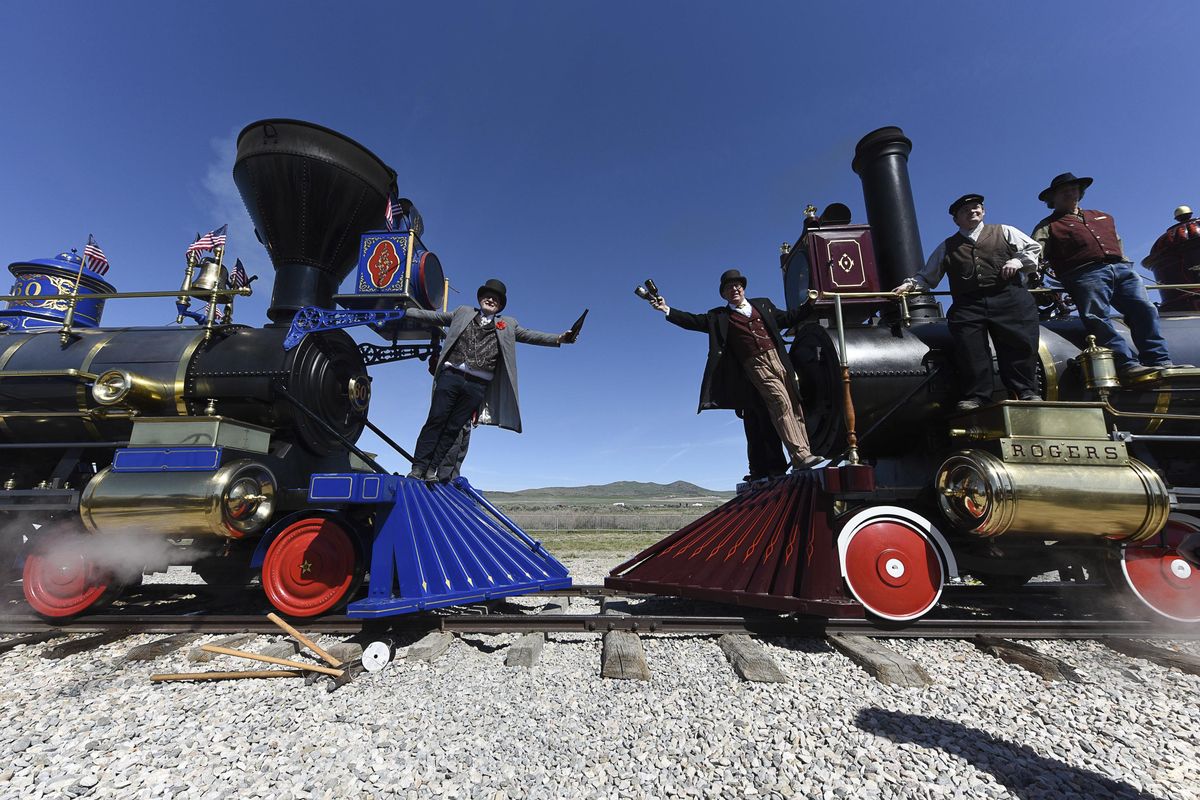Cannons, bells, music mark 150th anniversary of railroad

PROMONTORY, Utah – Thousands of people gathered Friday at the remote spot in the Utah desert where the final spikes of the Transcontinental Railroad were hammered 150 years ago, uniting a nation long separated by vast expanses of desert, mountains and forests and fresh off the Civil War.
Visitors traveled from as far as China and dressed in old-fashioned dresses, top hats and bonnets for the celebration featuring music, a flyover, the firing of cannons and ringing of bells at the Golden Spike National Historic Park, about 90 miles northwest of Salt Lake City.
It was the signature festivity of several days of events marking the railroad’s anniversary.

The 1869 completion of the 1,800-mile rail line shortened cross-county travel from as long as six months in wagons and stagecoaches to about 10 days on the rails and served as a unifying moment for the nation.
It became a pivotal moment in United States history that dramatically changed how people traveled and did business.
“It psychologically and symbolically bound the country,” said Brad Westwood, Utah’s senior public historian.
Bill Hanmer drove with his wife from their Middletown, Virginia, home to check off a bucket list item. The 73-year-old pilot and train enthusiast said he desperately wanted to attend the 100th anniversary event in 1969 but couldn’t afford it.
The laying of the final rails triggered a famous telegraph that set off celebrations around the nation: “The last rail is laid. The last spike is driven. The Pacific railroad is completed. The point of junction is 1,086 miles west of the Missouri River and 690 miles east of Sacramento City.”
The bells at Philadelphia’s Independence Hall rang in celebration, a hundred guns were fired in New York, and American flags were hung in cities across the nation.
The golden spike included an inscription: “May God continue the unity of our country as this railroad unites the two great oceans of the world.”
U.S. Transportation Secretary Elaine Chao and Interior Secretary David Bernhardt were scheduled to speak at Friday’s event. At least 15,000 attendees were expected, including large contingents from China, said Josh Loftin, a spokesman for the Utah Department of Heritage and Arts.
The railroad was built using horses, oxen, hand carts, wagons and the “brawn” of mostly Irish immigrants working on the portion that came from the East and mostly Chinese workers on the part that came from the West, Westwood said. They worked day and night and risked their lives blasting through rocks with black powder explosives and shoveling snow on frigid high mountain peaks, he said.
Westwood said it was built by the “most discriminated and least appreciated people in America.”
The epic construction of the railroad also had a dark side, leading to the near annihilation of the bison, eventual loss of land for Native American tribes and the deaths of several hundred railroad workers, Westwood said.
“It was a grand engineering feat, it was a grand gesture to bind the nation after the Civil War but it was also a story of human capital and what it took,” Westwood said.